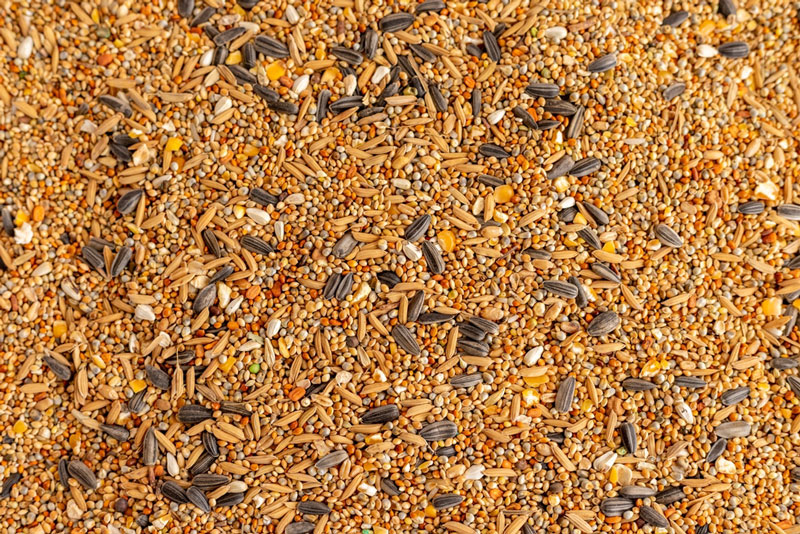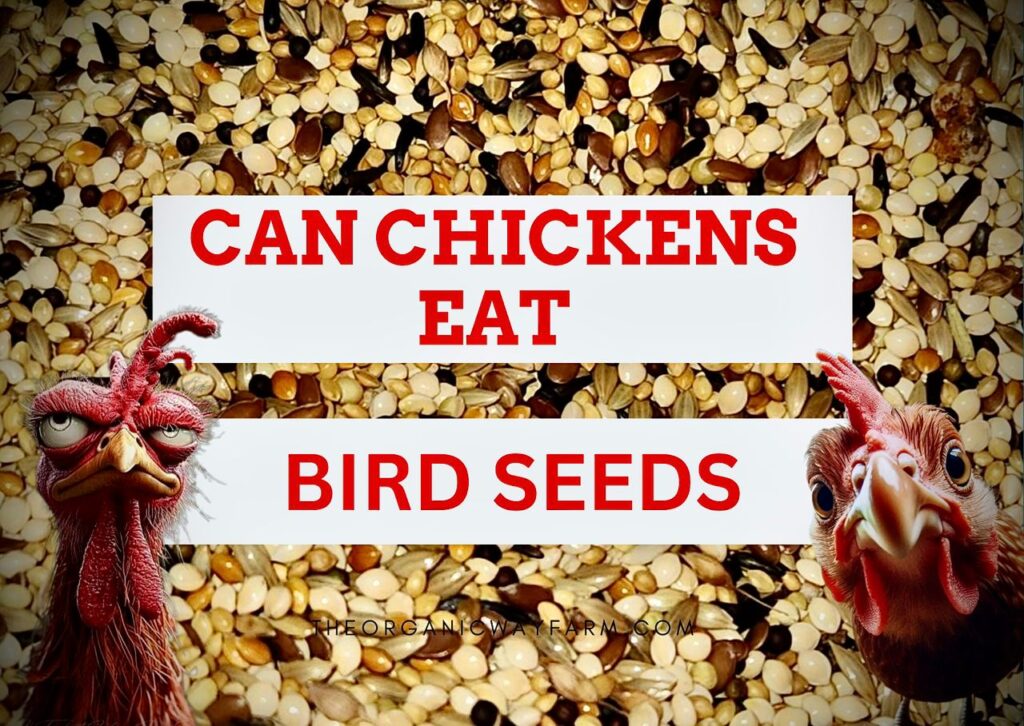If you have some curious chickens roaming in your backyard, you might be wondering “Can chickens eat bird seed?” You are not alone! This question comes up frequently among chicken owners.
The simple answer is YES, chickens can eat bird seed, but not all types of bird seeds are created equal. Some seeds can be beneficial to our feathered friends, while others might not be suitable for their diet. Understanding what types of seeds are safe and how to incorporate them can help us provide a nutritious treat for our chickens.
To truly grasp the ins and outs of feeding bird seed to chickens, we will explore various aspects of this topic together. Here’s a list of the subjects we will cover throughout this article:
- Can Chickens Eat Bird Seed?
- How Much Bird Seed Can Chickens Eat?
- Best Ways to Feed Bird Seed to Chickens
- Benefits of Feeding Bird Seed to Chickens
- Risks and Dangers of Feeding Bird Seed to Chickens
- Substitutes for Pomegranates for Chickens
Let’s get started!
Can Chickens Eat Bird Seed?

Chickens can eat certain types of bird seed as a treat. In fact, many chicken owners include bird seed in their chickens’ diets for the benefits it can provide. However, we should focus on what is healthy for our chickens. The best bird seeds for them are often sunflower seeds, millet, and oats. These seeds contain a variety of nutrients that can improve their health and support egg production.
Sunflower seeds are especially popular. They are high in healthy fats, which chickens need for energy. Millet offers protein and carbohydrates, contributing to a well-balanced diet. On the other hand, we should avoid seeds that contain chemical additives or preservatives. Some bird seeds might be mixed with unwanted ingredients that can harm our chickens.
How Much Bird Seed Can Chickens Eat?
When it comes to how much bird seed chickens can eat, moderation is key. We do not want to overfeed our chickens bird seed. While it can be a great addition to their diet, it should not make up more than 10% of their total intake. Chickens need a balanced diet, and their primary source of food should be layer feed or other nutritionally complete chicken feeds.
The size and age of our chickens also play a role in how much bird seed they can eat. Young chicks require different amounts of food compared to adult hens. As a guideline, we can start by offering a small handful of bird seed as a treat a few times a week, observing our chickens’ reactions and ensuring they remain healthy and active.
Over time, we can adjust the amount based on their preferences and overall health. If a chicken seems particularly fond of a certain type of seed, we can offer it as a reward for good behavior or during training sessions. Just be cautious not to let them fill up on treats instead of their regular feed.
Ultimately, the key to ensuring our chickens remain healthy is by offering variety in their diet. By providing bird seed alongside their regular feed, we can create a delicious and nutritious treat that compliments their staple food.
We can also sprinkle bird seed around their coop or yard to encourage foraging behavior, which is incredibly beneficial for their mental stimulation and overall happiness.
Best Ways to Feed Bird Seed to Chickens
Feeding bird seed to our chickens can be done in several ways. One popular method is to mix bird seed with their regular feed. This method introduces the seeds gradually and allows our chickens to get used to the new flavors while still maintaining a balanced diet. We can also scatter bird seeds around their outdoor area to encourage natural foraging behavior, which keeps our chickens active and engaged.
Another great way is to use a hanging feeder specifically designed for seeds. These feeders allow our chickens to reach the seeds easily and can help to keep the food clean and dry. We can fill the feeder with a mix of sunflower seeds, millet, and other safe seeds. Just remember to regularly clean the feeder to prevent mold or contamination.
When introducing bird seed to our chickens’ diet, we should observe them closely. If we notice any chicken is hesitant to eat bird seed or experiences any digestive issues, we may need to reconsider how we are feeding it. This could involve reducing the quantity, changing the type of seed we are using, or consulting with a vet for professional advice.
Also, to provide extra nutrition, we can combine bird seeds with fresh fruits and vegetables. By offering our chickens treats that are rich in vitamins and minerals, we can create a wholesome diet for them. Examples of safe vegetables include leafy greens and carrots. Being creative with the combinations we offer can help ensure our chickens enjoy a variety of flavors and textures.
Benefits of Feeding Bird Seed to Chickens
Hydration
Including bird seed in our chickens’ diet can contribute to good hydration. Seeds like sunflower seeds contain oils that can help keep chickens hydrated, especially on hot days. Keeping our chickens hydrated helps them regulate their body temperature and maintains healthy organ function.
Fiber
Bird seeds can also provide much-needed fiber, which plays a vital role in our chickens’ digestion. Fiber helps ensure that their digestive systems operate smoothly, preventing issues like constipation or other digestive problems. By incorporating fiber-rich seeds into their diet, we contribute to their overall well-being.
Vitamins and minerals
Bird seeds are rich in essential vitamins and minerals. For instance, sunflower seeds are an excellent source of Vitamin E, which supports healthy skin and feathers. Other types of seeds provide various minerals like magnesium and phosphorus, contributing to strong bones and overall health. By giving our chickens a variety of bird seeds, we can ensure they receive these necessary nutrients.
Mental stimulation
Bird seed can also provide mental stimulation for our chickens. Scatter feeding encourages natural foraging instincts, making them happier and less bored. Happy chickens result in healthier eggs and improved overall well-being.
Nutritional breakdown of bird seeds
The nutritional breakdown of bird seeds varies based on the type of seed. For example, sunflower seeds are high in fats and protein, while millet offers carbohydrates and some protein. By offering a blend of different seeds, we give our chickens a balanced variety of nutrients to support their health.
Dangers of Feeding Too Much Bird Seeds to Chickens
While bird seed can be beneficial for chickens, there are risks and dangers to be aware of. Some seeds may contain additives that are harmful to chickens, so it is vital to read the labels when purchasing. If we notice an unusual reaction in our chickens after eating bird seed, it’s important to consult a vet immediately.
Overfeeding bird seed is another risk. Seeds are high in fats, and chickens that consume too many calories may lead to obesity. Obesity can cause health problems, including poor egg production and mobility issues. Therefore, maintaining that balance and moderation is crucial.
Some seeds, particularly if fermented or spoiled, can lead to digestive issues. Be cautious about cleanliness and freshness when offering bird seed to our chickens. Avoid offering seeds that have been sitting around for an extended time or that show signs of mold.
Also, be conscious of allergies. In rare cases, chickens can be allergic to specific seeds. Monitoring their behavior after introducing new seeds can help identify any potential allergies or reactions.
Lastly, we should strive to provide diversity in their diet. Relying too heavily on bird seeds may lead to nutritional deficiencies. It is important to stick to a well-rounded diet, ensuring that our chickens are receiving a variety of nutrients from different food sources.
Substitutes for Bird Seeds for Chickens
If we find that bird seed is not the best option for our chickens, there are several substitutes we can consider. One alternative is offering grains such as oats and barley. These grains provide similar benefits and can be more easily sourced without additives.
We can also introduce legumes, like peas, which are rich in protein and can be mixed with chicken feed. Additionally, fruits and vegetables like pumpkins, carrots, or leafy greens serve as healthy substitutes that can keep our chickens entertained and well-fed.
Finally, if our chickens enjoy scratch grains—a mixture of seeds and grains—this could be a perfect alternative to bird seed. Scratch grains can help support their natural foraging behavior while providing a variety of nutrients.
Frequently Asked Questions
Can all types of bird seeds be fed to chickens?
Most basic bird seeds such as sunflower seeds, millet, cracked corn, and safflower are safe for chickens. However, mixes made for wild birds may include additives or seeds that aren’t ideal. Always check for salt, artificial colors, or unknown seed types before feeding.
How do I know if my chickens like bird seeds?
You’ll know your chickens enjoy bird seeds if they run toward them, peck eagerly, scratch around for more, or eat the seeds before other treats. If they ignore the mix or only pick out certain seeds, they may prefer specific types instead.
Can bird seed be given every day?
No, bird seed should not be given daily. It’s high in fat and low in complete nutrition, so it should only be offered a few times a week as a treat. Too much can lead to weight gain and reduced egg production.
Are there any seeds to avoid?
Avoid seeds that are moldy, salted, flavored, or treated with chemicals. Also avoid fruit pits and apple seeds, as they contain compounds that can be harmful in larger amounts.
Can I use bird seed instead of chicken feed?
No, bird seed cannot replace chicken feed. It lacks the balanced protein, vitamins, minerals, and calcium chickens need to stay healthy and produce strong eggs. Use bird seed only as a supplement, not as a main diet.
Final Thoughts
In conclusion, offering bird seed to our chickens can be a fun and nutritious treat as long as we remember to do so in moderation. A balanced diet is essential for our feathered friends. Keeping an eye on how they respond to bird seed will help us provide the best care. There’s a wealth of information available on poultry, so if you’re looking to expand your chicken knowledge, check out more topics such as can chickens eat grapes. Together, let’s ensure our chickens lead happy and healthy lives!






